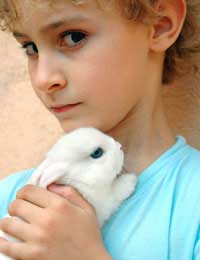Pet Allergies and Your Child

Pet allergies are a common problem among children and adults which is becoming more common in recent years for a number of reasons. So there is a definite chance your child may have an allergic response to animals or develop one later in life even if you are unaware of it right now. Read on to understand the hows and whys of allergic reactions and how to minimise them with kids and pets.
Solving the Problem Before it’s a Problem
Once your kids have formed attachments to the pets they are allergic to, it’s pretty hard to solve the problem without causing emotional moments and a little heartbreak if the allergic reaction is too strong to keep the pet anymore. So before bringing a new animal home, test out your kid’s resistance to animals by going over to a friend’s, family’s or neighbour’s house with pets, visiting or volunteering at a shelter, or even doing some pet sitting or dog walking to give them some exposure. Rub some of the animal’s fur against your child’s skin and have them spend time with animals inside a room without much ventilation to be sure there is no reaction.The Whys of Allergies
Understanding what is triggering your child can help you minimise the effects. Your child is actually allergic to the protein allergen that is in your pet’s saliva, which sticks to groomed fur, dander (skin flakes), furniture, carpets, etc. Incidentally, cats are far more likely to trigger reactions than dogs as their dander is finer and ‘stickier’. Dust mites, fumes, smoke, sprays and pollens often cause similar reactions or worsen the reaction in those allergic to animals so eliminating or reducing exposure can improve a pet allergy as well.Preventive Measures
So you already have a beloved family pet or your child’s allergic reaction is one that can be worked with? Here are some of the best ways to minimise allergic triggers:Keeping your pet clean and groomed is one of the best ways to minimise your child’s exposure to dander and allergens. Shampooing your pet twice a week with a proper pet shampoo to prevent dander building up and always use a conditioner afterward as it keeps the skin moisturised and less allergens store up on your pet’s fur. Groom your pet outside or in an area where the air won’t circulate.
Clean air means less dander floating around the house. Good ventilation, air purifiers like a HEPA air filter, dusting with a wet cloth and using and an excellent, double bag vacuum (which you would also empty outside) will greatly improve matters around the house for your allergic child. A HEPA filter in the child’s bedroom is exceptionally beneficial as that guarantees a pure air flow at least 8 hours a day which cuts down on the strength and frequency of reactions. Never let pets into allergic children’s bedrooms and it’s best to keep animals off furniture as well since dander really sticks into the fine holes in the fabric and seams.
Feeding a pet more oil in their diet, spraying down their coats with a conditioning spray and rubbing down the skin with Neem oil reduces dander in your environment. Neem oil also doubles as a flea repellent, which causes scratching and dander spreading as well.


Re: Is Your Child Ready to Walk the Dog?
I am 12 located in oudtshoorn I love animals and would love to walk ur dog thank you
Re: Is Your Child Ready to Walk the Dog?
I am a 12 year old that love dog and I love walking your dog so pls let me do so
Re: Is Your Child Ready to Walk the Dog?
Hi I am eva I am 11 and my freind is 10 me and my freind love dogs and love walking and have loads of experience with…
Re: Is Your Child Ready to Walk the Dog?
My name is halima and I am 10 I want to walk dogs because they are my favourite animal and I would enjoy to walk them
Re: Is Your Child Ready to Walk the Dog?
Hi,my name is Emma I am 13 years old I have 2 dogs of my own and I train one of them I love all dogs and have walked…
Re: Is Your Child Ready to Walk the Dog?
Hi I'm Hamish I'm 10 years old I want to do dog walking to save up to spend time with my family in Australia I like dogs…
Re: Is Your Child Ready to Walk the Dog?
Hi,my name is Mario and I am looking for a job to do with dog walking,I’m looking to save up money for the summer
Re: Is Your Child Ready to Walk the Dog?
Hi,my name is Mario,I’m 11 years old and I’m looking for a job to do with dog walking,I need the job because I want to…
Re: Is Your Child Ready to Walk the Dog?
Hi my nam is Harley I want to walk dogs with my friend Chris we are both 10 an experienced dog walking
Re: Is Your Child Ready to Walk the Dog?
Hello, I am 11 years old and I would love to be a Dog Walker! I have walked dogs all my life and been around animals all…